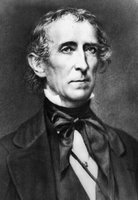And Tyler, Too

John Tyler, 10th U.S. President, was born on this day in 1790 at Greenway, Charles City County, Virginia.
The son of a governor of Virginia, charming, dignified Tyler grew up in the rarefied, elite world of the Southern gentry: he studied at William and Mary, adopting Adam Smith's Wealth of Nations as his socioeconomic bible, and then clerked for Edmund Randolph before entering the bar in 1809.
During the War of 1812, Tyler helped to organize a small militia company, the Charles City Rifles, and served as its captain. Although most sources politely say that Tyler's war service was "uneventful," there does seem to be a persistent legend that Tyler and his men camped in the main hall at William and Mary one evening after the British raid on Hampton, like the Little Rascals playing firemen; and that in response to some suspicious noises, Tyler rousted his men. Perhaps a little too eager to meet their foes, the men plowed down the main stairway a little too fast, collapsing in a messy heap at the bottom of the stairs. The British were nowhere to be seen, and the soldiers sheepishly went back to bed. For this little episode and the remainder of his brief tenure, Tyler received about 160 acres of land near what is now Sioux City, Iowa, in payment from the federal government.
By lineage Tyler was destined for a career in public service, and he entered the Virginia House of Delegates in 1811; spent a stint in the U.S. House of Representatives before being elected governor of Virginia (1825), then served as U.S. senator (1827). Politically, he was a staunch supporter of states rights, opposing the Bank of the United States and federal improvement programs; condemning the Missouri Compromise as unconstitutional in that it granted Congress the power to restrict slavery; and as senator cast the lone vote against President Andrew Jackson's plan to use armed force to enforce a federal tariff in South Carolina.
The latter episode sent him drifting into the camp of Henry Clay and the Whig Party, viewing Jackson as pretending to dictatorship (although he agreed with Jackson on the fate of the Bank of the U.S.). In the chaotic election of 1836, Tyler was nominated for vice president by the Whigs of certain states, appearing on the ballot with presidential nominee Hugh White in some states, and with presidential nominee William Harrison in others. Tyler returned to the Virginia House of Delegates after the Whigs were defeated, but was nominated for vice president again by the consolidated Whigs in 1840 on the ticket with his former neighbor William Harrison, thus giving rise to the famous campaign slogan "Tippecanoe and Tyler, too." This time, the Whig ticket prevailed, and Tyler became vice president.
Barely a month after Harrison's inauguration, Tyler was awakened at his home in Williamsburg on the morning of April 6, 1841 to learn that Harrison had died. He was sworn in as president later that day, the first vice president to succeed to the office after the death of a president. The succession was by no means a fait accompli, however: leaders in Washington differed over whether the office of the presidency or merely the powers of the president were to devolve on Tyler.
Tyler flatly refused to be dealt with as "acting president" (he returned unopened all letters addressed to the "acting president") and thereby set the tone for all presidential successions thereafter -- despite the fact that he was referred to by his political adversaries as "His Accidency." His states-rights pedigree quickly got him into hot water with members of his own party: when Henry Clay attempted to resurrect the National Bank, Tyler vetoed it twice, causing his entire cabinet (except for Secretary of State Daniel Webster) to resign in September 1841. Two members of his new cabinet, Abel Upshur and Thomas Gilmer, died at a presidential party on board the USS Princeton when a new weapon exploded during a demonstration. Before leaving office, Tyler signed a joint congressional resolution approving the annexation of Texas (a measure he initially proposed as a treaty, but could not get the Senate to ratify).
A man without a party, Tyler retired to his 1,200-acre plantation "Sherwood Forest" with his second wife Julia, whom he had married while president, almost 2 years after the death of his first wife; between his two wives, Tyler fathered 14 children, more than any other president.
In 1861, he was elected to the Confederate Congress, true to his states' rights philosophy to the end, but he died (on January 18, 1862 at the Exchange Hotel in Richmond, Virginia) before taking his seat.
Categories: US-Presidents, American-Politicians, Presidential-Campaigns





0 Comments:
Post a Comment
Subscribe to Post Comments [Atom]
<< Home